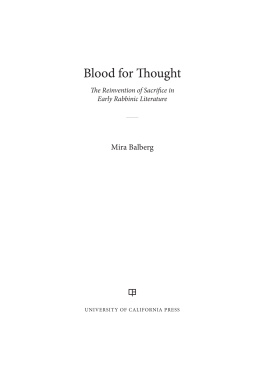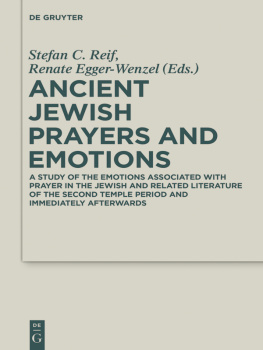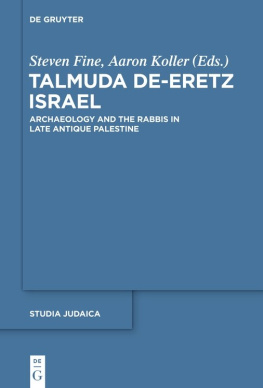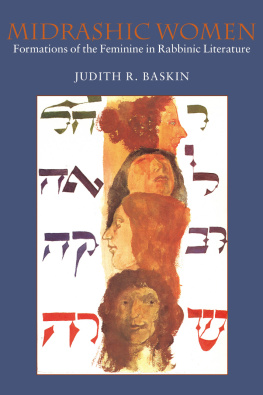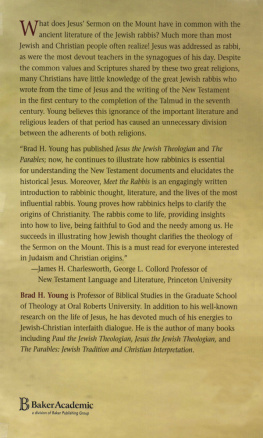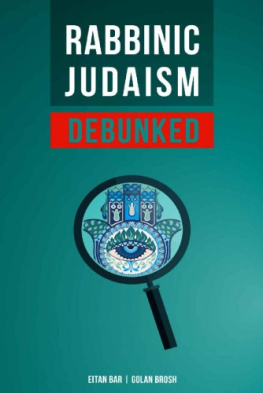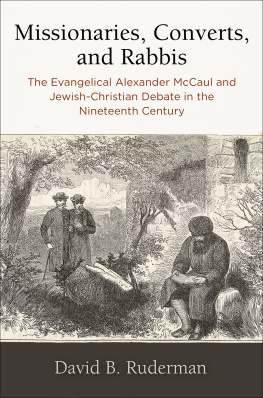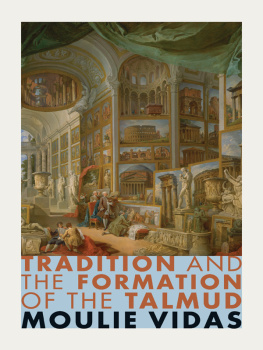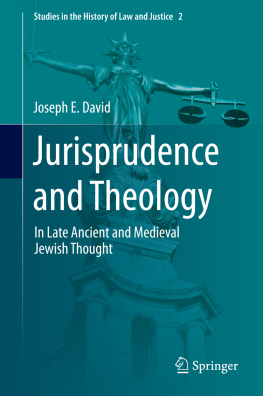ACKNOWLEDGMENTS
Much of this book was written during 201415, a year that I blissfully spent as a fellow at the Frankel Institute for Advanced Judaic Studies at the University of Michigan. I thank Mikhail Krutikov and Deborah Dash Moore for extending to me the invitation to the institute, and to the institutes fellows and staff for creating a wonderfully nurturing and stimulating intellectual environment. I completed the book at my academic home at Northwestern University, where my colleagues in the Department of Religious Studies continue to offer support, advice, wisdom, camaraderie, and laughs on a daily basis. A generous grant from the Alice Kaplan Institute for the Humanities at Northwestern helped this book see the light of day.
The seed from which this book sprouted was sown almost two decades ago, in the classes that I took as an undergraduate student at the Hebrew University in Jerusalem with Baruch Schwartz, and particularly in his memorable class on the book of Leviticus. My ongoing interest in the intersection of cult and literature was born in Professor Schwartzs classes, as was my emerging understanding of the complexityand the rewardsof careful and close work with ancient texts. His outstanding classes have profoundly shaped me as a scholar and a teacher for years to come.
Moulie Vidas was the guardian of this book from its very inception: from his initial this needs to be a book response when I first shared with him some very incoherent thoughts on the topic of sacrifice in rabbinic Judaism, through avid inquiries about how the project was coming along and constant encouragement that it was a worthwhile project, to his accurate and insightful comments that made many arguments suddenly come together. Thanks to my friendship with Moulie, writing is often transformed from a lonely and frustrating process to a stimulating and exciting opportunity for dialogue.
Four colleagues, whom I consider both mentors and friends, read the manuscript in its entirety and offered perceptive comments and highly useful observations. Azzan Yadin-Israels attention to details while keeping track of the bigger picture was unparalleled. Richard Kieckhefer was a wonderful conversation partner, who gave solid advice on all frontsintellectual, stylistic, and pragmatic. Haim Weisss literary sensibility, and the depth of his cultural insights, helped me greatly in fine-tuning my presentation. Finally, Ellen Muehlberger read the manuscript in the same way that she has read every single thing I have written in the past few years: with a keen eye for elegance and coherence, and with unfailing support and encouragement.
I am truly grateful to the two readers for the press, who gave this book the closest, most engaged, and most charitable reading I could hope for. In their comments they astutely identified arguments that needed to be strengthened, connections that needed to be tightened, overstatements that needed to be refined, and vague points that needed to be clarified, and the book is much improved thanks to their suggestions. One of the readers, Yair Furstenberg, was kind enough not only to reveal his identity but also to share with me extensive and highly detailed comments on the manuscript, well beyond the call of duty: I was therefore fortunate to benefit from his vast knowledge and insurmountable textual skills while working on this book, as I have been in the past. I also wish to thank Raanan Boustan, for his enthusiastic support of this book from beginning to end.
The ideas and analyses in this book were shared, in multiple configurations and forms, with several brilliant friends who offered valuable thoughts during multiple stages of the project. I wish to thank Ishay Rosen-Zvi for steering me away from the trite and the obvious, and especially for stressing the importance of looking at ritual narratives; Alexei Sivertsev, for enriching my readings both with theoretical sophistication and with broader cross-cultural knowledge; Simeon Chavel, for helping me to engage with biblical texts in a multilayered and nuanced way; and Gil Klein, for wonderfully innovative approaches to rabbinic texts and delightfully fun conversations. Special heartfelt thanks to Rachel Neis, an inspiring and incisive thinker and dialogue partner, and to Yair Lipshitz, my intellectual and emotional kindred spirit, not only for making my academic work more interesting and exciting, but also for true friendship in a time of need, which will never be forgotten.
In the course of my work on this book I have had the opportunity to present parts of it at Princeton University, Yale University, the University of Michigan, the Hebrew University in Jerusalem, Northwestern University, DePaul University, and the University of California, Los Angeles. I am grateful to all those institutions for their kind invitations, and to their faculty and students for their thoughtful feedback.
It has been, once again, a true pleasure to work with Eric Schmidt of the University of California Press, a wonderfully engaged and supportive editor who is genuinely committed to furthering good scholarship. I am grateful to Eric, to Maeve Cornell-Taylor, and to Cindy Fulton for bringing this book to life. I am also indebted to Marian Rogers for meticulously copyediting the manuscript, and to Al Peters for the skillful preparation of the indices.
My parents are a steady source of love and support, unfailingly enthusiastic about all that I do, and unfailingly generous in all matters, great and small. To them, as well as to my brother and sister, my mother-in-law and father-in-law, and my extended family, I am profoundly indebted and eternally grateful.
My gratitude to Tim DeBold goes well beyond the fact that he read every page of this book and patiently endured many hours of conversations about its most minute details. I thank him for knowing how to make the mundane exciting and the frustrating amusing, for giving me a home and for showing me the world outside of it. Te vox mea nominat unam .

